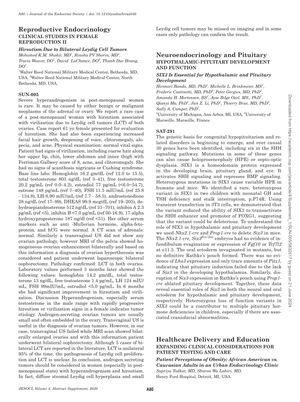Hirsutism Due to Bilateral Leydig Cell Tumors
April 2020
in “
Journal of the Endocrine Society
”
hirsutism virilization facial hair growth clitoromegaly alopecia acne testosterone hormonal imbalances transvaginal ultrasound MRI bilateral ovarian enhancement laparoscopic bilateral oophorectomy Leydig cell tumors androgen-secreting tumors hyperandrogenism facial hair hair loss hormone imbalance ultrasound MRI scan ovary removal LCT androgen tumors high androgen levels

TLDR A woman's severe hirsutism was caused by Leydig cell tumors in her ovaries, which improved after surgery.
In 2020, a case was reported of a 61-year-old post-menopausal woman who presented with severe hirsutism and other signs of virilization, including increased facial hair growth, deepening of voice, clitoromegaly, alopecia, and acne. Her lab results showed significantly elevated levels of total and free testosterone, among other hormonal imbalances. Imaging with a transvaginal ultrasound did not reveal any ovarian pathology, but an MRI indicated bilateral ovarian enhancement. She underwent a laparoscopic bilateral oophorectomy, and pathology confirmed Leydig cell tumors (LCT) in both ovaries. Three months post-surgery, her hormonal levels normalized, and after six months, her symptoms of hirsutism and virilization significantly improved. This case underscores the importance of considering androgen-secreting tumors in post-menopausal women with hyperandrogenism and hirsutism, as imaging may not always detect such tumors and sometimes only pathology can confirm the diagnosis.
